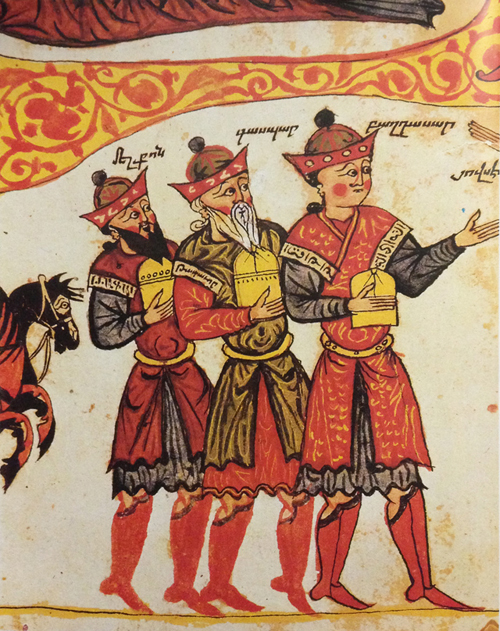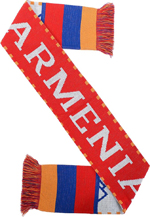We asked community leaders of various ethnic heritages to share some holiday traditions of their culture. Anita Kazarian says "Armenians get to celebrate Christmas twice!"
 Armenian illustrated manuscript page of the Adoration of the Magi
Armenian illustrated manuscript page of the Adoration of the Magi
Why Armenians observe Christmas on January 6
Armenians are the only Christians in the world to celebrate Christmas on the 6th of January as was the ancient custom. Why? The reason is not in the difference between the old and the new calendar.
The exact day of Christ's birth have never been satisfactorily established, because nothing definite has been said about it 1n the Gospels. But it is a historical fact that the celebration of Christ's birth on the 6th of January in all the Christian churches goes further back than that of the December. The name of the festival was neither "Christmas" nor "Nativity." It was called "Theophany" which is a Greek word meaning Manifestation or Revelation of God. The Armenian Church still keeps to this older date of the 6th of January and to this older name, for in the Armenian language the proper appellation of this festival is "Asdvads-a-haydnootiun" which is a literal translation of "Theophany."
The feast of Theophany covered, in the early centuries, the celebration of the Birth and the Baptism of Christ. There are many historical proofs in support of this Joint celebration of Baptism and Christmas, under the heading of Theophany on the 6th of January.
HISTORICAL EVIDENCE
As early as A.D. 386 the 6th of January was observed in Bethlehem, Holy Land, as the day of Christ's Birth and Baptism. Etheria Silvia of Bordeaux, the famous pilgrim, whose writings about her pilgrimage to the Holy Land (in 385) have been recently discovered, testifies that in her time the 6th of January was observed in Bethlehem as the feast day of Christ's Birth. About the same time, Pope Siricius of Rome speaks of the 6th of January as Natalitia Christi, meaning Birthday of Christ. One of the Church Fathers of the 4th Century, St. Ephiphanius, says quite clearly "January 6th is the day of Christ's Birth."
John Cassian asserts in his "Collations" (written in 418-427) that the Egyptian monasteries still observe "the ancient custom" celebrating the Nativity and the Baptism on January 6. Ephraem the Syrian (373 A.D.) proves that Mesopotamia still put the Birth feast 13 days after the Winter Solstice, i.e. 6th of January.
In the West, the Council of Saragossa (Spain) in 380 ignored the December 25th. Contemporary historians date a visit of Julian the Apostate to a church in Gaul (France) in 361 on "Epiphany and Nativity" which shows that at that time the feast was still combined in Gaul.
From these few quotations, it is clear that both in the West and in the East, the celebration of Christmas and Baptism were combined and observed on the 6th of January. Why was 25th of December decided upon as the day for celebration of Christ's Birthday?
WHY THE CHANGE TO DECEMBER 25?
A letter from a Bishop of Rome in the 4th century has been quoted relating to the joint celebration of the Birth and Baptism of Christ on the 6th of January. "The faithful" the letter says, "met before dawn at Bethlehem to celebrate the birth from the Virgin in the cave; but before their hymns and the lections were finished they had to hurry off to river Jordan (13 miles from Bethlehem) to celebrate the Baptism. The consequence was that neither commemoration could be kept fully and properly." The writer then goes on to plead with the Bishop of Rome to ascertain the exact date of Christ's Birth, or else to find some means to celebrate them separately. This letter shows the origin of the future change and one of the reasons of separating the celebration of the Birth from that of the Baptism.
The more practical reason seems to be that December 25, in the Roman Empire, was a great feast date connected with the "Birth of the Sun" known "Saturnalia," since just after the Winter Solstice. Because of the promise on that day, 25th of December, of longer days to follow, there were great rejoicings. The Church merely introduced the Birth of Jesus on that date to divert the faithful from attending the "abominable" celebrations of Saturnalia to what became Christmas.
The new Christmas having been started in the West, spread very quickly to the East and all over the Roman Empire. The change did not penetrate into Armenia for two reasons: first, because Armenia was not within the Roman Empire, and secondly, Armenians having no such pagan festival on the 25th of December to suppress, did not see a reason to follow the new custom. So they did and still continue to celebrate of January 6th.
***
Stay informed about the local Armenian community by signing up for the free Cleveland Armenian eNews mailings. You can select other groups as well. It's easy and free.
Fill out the form for the free Armenian eNews.
***
Top of Page
Back to Cleveland Armenians
Back to Ethnic Holiday Traditions
| 









